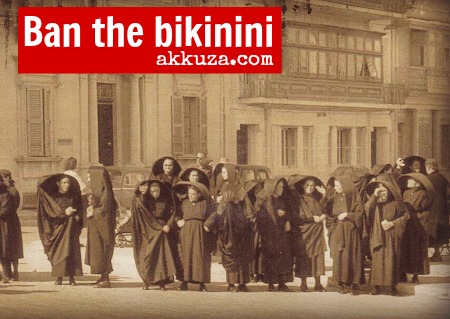A French court has given some reprieve to the burkini craze that struck the last part of the crazy summer news. After several French beach-side resorts had banned the wearing of the burkini at the beach things had gotten even hotter with a few incidents of aggression. We had also seen some officers of the law inflict fines on women who insisted on wearing the apparel that many conservatives perceived to be provocative. One aspect of the burkini saga was particularly jarring and confusing. On the one hand those who could be said to be of a liberal frame of mind would argue that it is not up to the state to tell women what they can or cannot wear at the beach. This was not to be an extension of the “public security” debate surrounding the burqa. Here was another facet of the issue – whether the wearing of a burkini is yet another vindication of the rights of self-determination under the western-style package of individual rights. The counter-argument of course was made that the burkini is yet another extension of the “oppressive” nature of Muslim strictures. Women, the counter-argument goes, should not be forced to wear a burkini or a burqa and therefore should either not wear them or basically not turn up at the beach at all.
I admit that it is all mighty confusing. The whole question of volition lies behind the dilemma. Is it a choice that women make of their own volition or is it something that is being forced upon them by their religion? If it is being forced upon them under the religion they freely choose to adopt is it then up to the state to prohibit the wearing of more modest attire? This is not a question of mores per se. After all we only (only?) have to go back around a hundred years to find that the social regulation of modest attire at the beach was a standard held highly by the majority of the members of society. Even closer to this day and age I have a very clear recollection of groups of women hitting the beaches early in the morning and swimming in full black dress. A religious inclination and interpretation of the concept of modesty was behind it all at the time too.
I’m just back from a holiday in the states during which I had the chance to swim in a couple of hotel pools to cool off the California sun after a day of driving and touring. It was not uncommon to share the pool with men who swam in t-shirt and shorts – modesty? Perhaps. Or maybe, unlike me they were not prepared to wield the sad excuse for a beer belly that I have developed. The thing is that swimming attire IS a question of choice and the state should not be anywhere near regulating what people wear when they take their dip. The whole burkini issue got out of hand – primarily because what people wear to swim is no business of the state but also because discussing the oppression of women by some religion or another has no place in this context.
Watching Maltese persons comment on the burkini ban was another thing altogether. This is a country that still regulates what people can or cannot wear at the beach by law anyway. A woman opting to sunbathe topless in Malta will almost certainly feel the strong arm of the law come down on her. Streaking is also against public mores for the most part and the recent trend of gentlemen taking up nude walking along the sea front does not seem to be forcing any change in the status of illegality that they enjoy.
The reality on the tiny Mediterranean island is such that anybody barking about the burkini ban missed the fact that we are quite content in having the state tell us what we can or cannot wear on our own beaches without as much as batting an eyelid. Add that to your list of ironic things if you are Maltese lovinmalta, I’m sure you’ve got one somewhere.

